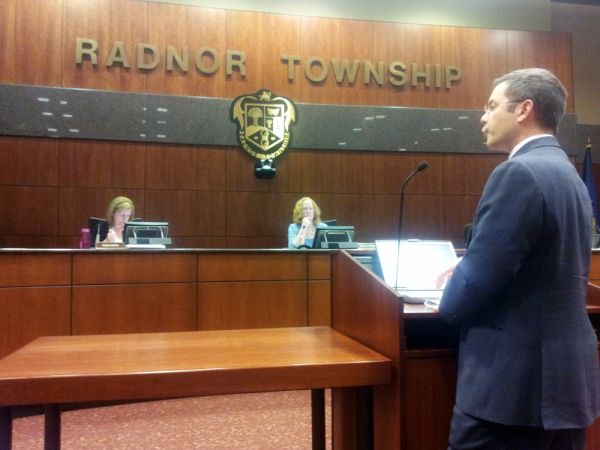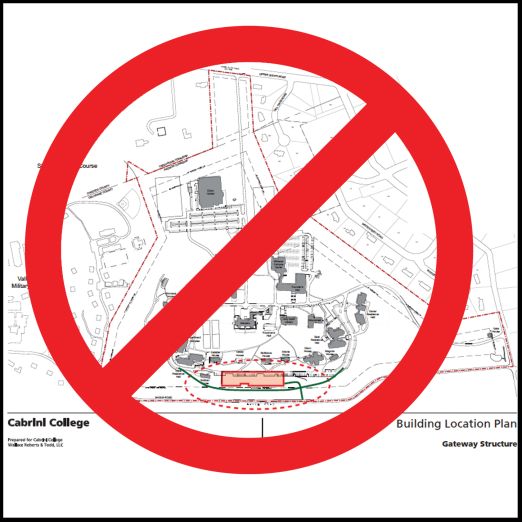The Cabrini’s Gateway Project came up for a preliminary discussion during a meeting held by the Radnor Planning Commission on Monday, Feb. 6.
Standing as only a fraction of the college’s 14-year Master Plan, the project consists of the construction of a multi-level parking garage along the length of campus directly facing Eagle Road. This structure would be built in line with Cabrini’s recently-adopted “pedestrian-friendly” philosophy, with the idea being that parking should be limited primarily to a more manageable area with the rest of campus remaining virtually free of cars altogether.
The commission, however, unanimously disapproved of the college’s current plans regarding the structure and were supported by voices of those residing in neighborhoods that are likely to be affected by this construction. Largely, the issues were opposed with the garage’s potentially unaesthetic appeal in mind as well as its encroachment on the natural environment of the township. In addition, though, issues were also raised with the proposed construction of a left-turning lane for the new entrance onto campus for the garage’s purposes, which was seen by the Radnor Planning Commission as too risky given the narrow, winding nature of Eagle Road.
The Planning Commission is merely an advisory body to the Township Board and will further advise the board.
Those present for the proposal on behalf of Cabrini included Howard Holden, the director of facilities, and Frank Tavani, the principal engineer from F. Tavani and Associates, a traffic engineering and planning corporation that has studied the traffic patterns of all roads surrounding the college, including Eagle and King of Prussia Roads.
A good portion of Cabrini’s appeal of its Gateway Project was spent discussing the technical aspects of traffic engineering and the complexities therein, all of which appeared to frustrate the members of the commission due to the fact that they hadn’t received a single page of what was presented to them at the meeting prior to that same day.
“This project, in and of itself, does not include any classroom space. It does not include anything that’s going to increase the student body,” Tavani said. “It’s really an amenity to the campus that’s going to help Cabrini keep competitive in the marketplace and serve existing needs.”
The Gateway Project is only one of two projects currently underway that have ties to Eagle Road. Eastern University has its very own project in its midst: a new student center.
“The information that was provided led me to have more questions,” Amy Kaminski, senior transportation engineer at Gilmore & Associates and the commission’s own traffic specialist, said. “I do my driving based on minimal time path: what’s my quickest way to get from Point A to Point B? And I don’t think going through a college campus would be the most direct route to the parking garage; I just want to make sure it’s designed correctly.”
The existing entrances to the campus were also examined under particular scrutiny, given their potential to devolve into a somewhat disjointed nature if the campus were to proceed in the advisedly more pedestrian-friendly manner.
“We would be closing the current Eagle Road entrance to only emergency access vehicles,” Holden said. “There will still be a number of surface parking spaces available for those who are coming in from the Upper Gulph Road entrance.”
Holden also commented on the “gated community” aspect of Cabrini’s campus, stating that a gate would additionally be included at the new Eagle Road entrance. Because of this, the gate – like the rest of the gates on campus – would be closed between the hours of 10 p.m. and 6 a.m., limiting those parked within the parking garage to only being capable of leaving campus through the Upper Gulph entrance.
“As a part of this application, there will be 116 parking spaces removed,” Rob Lambert, the founding principal of Site Engineering Concepts, LLC., said. “We are proposing 711 new parking spaces … If we’re required to, we’ll decommission already existing parking spaces on-campus, and whether that’s just fencing them off so nobody can use them … we can go that route.”
Lambert’s estimates are based on the premise that there are currently 952 parking spaces available on-campus, with the college’s ultimate goal of 1,066 spaces after construction of the Gateway parking garage. With this in mind, if only 116 of the 952 preexisting spaces are outright removed, there will be over 800 parking spaces that will be “roped off” or will otherwise undergo similar decommissioning.
Much mutual deliberation was undertaken throughout the duration of the proposal, with the delicacy of such decision-making seeming apparent given how interconnected both the commissioners and community members at large appeared.
Matthew Marshall, a former member of the planning commission and resident of Radnor Township, stated that he saw the development of the Gateway Project as “the most aggressively intrusive project since Villanova’s planned health clinic … There’s a complete insensitivity by the applicant to what is going on in the surrounding neighborhood.”
“The environmental impact, I think, is very severe,” Frank Brown, resident of Woodcrest Road, said. “The ‘greening’ is fine up by Upper Gulph, but the negative impact is going to be down at the other end, where they’re taking down the trees, taking the woods away, the shrubs away … I think that is going to be a disappointing thing for the community – and certainly for the neighbors.”
In likeness to these public opinions, the commission members themselves were unanimously in disfavor of the Gateway Project application as it presently stands.
“I feel so strongly that that building is in the wrong place,” Julia Farrell Hurle, one such commission member, said. “No matter where that building is, it’s unusual for Radnor Township – we can’t envision it like if you say, ‘We’re putting in a Rite Aid, or putting in a housing development.’ We can envision that. Even though this is the preliminary stage of the development, we need graphics. We need an elevation, we need pictures, we need to see how it relates to the land … And I can’t see moving forward without that information.”
As Hurle exemplified in her closing comments, what ultimately spoiled Cabrini’s proposal of the Gateway Project was the college’s unpreparedness, as was evident at the meeting. Neither substantially graphical nor especially concrete and affirmative explanation of what the parking structure may look like was provided, which unnerved both elected officials and citizens alike.
With the next hearing on the matter purportedly set for mid-April, however, ample time has been provided for Cabrini to reassess the very foundation of its controversial project.
** These corrections have been made to the above article and are now reflected in the current version.
- The Planning Commission is merely an advisory body to the Township Board; the College is in the preliminary approval stage of the process.
- The Planning Commission did not “reject” the proposal; they tabled it for further discussion.
- The fate of the project was not “ultimately decided” if the project will be discussed in further detail. The Commission has not voted yet on the project.




